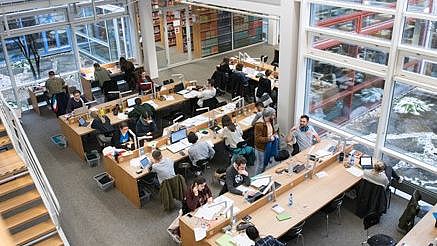Develop model-driven software
Top career prospects are included

It concerns all aspects of conceptualising and realising new, large-scale software systems, as well as restructuring and reusing existing software. This includes, in particular, methodological aids such as processes, models, tools and principles of systematic development of software systems, solid knowledge of quality control and relevant knowledge and experience in the area of project management.
Bachelor of Science (BSc)
180
6
Top career prospects are included
The bachelor's programme in Software Engineering combines the content of a computer science degree course with its respective applications in the development of comprehensive systems. In addition, there are teaching units on Business Management/Administration, user interface design and media law.
Our graduates have a broad basic knowledge of the Computer Science-specific areas of Software Engineering as well as a good knowledge of business administration and management. They are able to analyse comprehensive requirements for software systems, develop appropriate solution concepts and select and apply tools and methods. You will be able to work in a process-orientated manner and take on various aspects of project management independently.
Excellent student-to-student ratio:
The ratio of teaching staff to students allows us to provide students with excellent support. The exercise groups and tutorials are manageable, the formation of learning groups is specifically encouraged and additional offers such as programming workshops and the use of electronic communication and learning platforms make it easier to get started in this versatile subject.
Practical relevance through projects:
Two extensive software projects are carried out in each of the 2nd and 3rd Bachelor's years, partly in co-operation with industry. This gives the study/degree programme an extraordinary practical relevance in line with the motto: You can't just learn Software Engineering, you have to experience it!
■ Introductory courses in object-oriented, functional and logical programming
■ Software technology
■ Two extensive software projects in a team
■ Database programming
■ Creation of graphical user interfaces
■ Algorithms and data structures
■ Fundamentals of Computer Science, Operating systems and networked systems
■ Formal fundamentals and logic
■ Security in IT systems
■ Artificial intelligence and neuroinformatics
■ Mathematics (linear algebra, analysis and applied stochastics, empirical research methods)
■ Sound basic training in current developments in Computer Science
■ Practical relevance and experience gained through extensive software projects
■ Flexible specialisation through elective options in the 3rd Bachelor's year (including Requirements Engineering, Compiler Construction, Web Engineering, Management of Software Projects, User Interfaces)
■ Mathematics training camp before the beginning of the programme
■ Revision courses to prepare for exams
■ Tutorials in small groups
■ Small discipline with excellent support and numerous contact persons
■ Several computer pools (Windows and Linux), university-wide WLAN, numerous notebook workstations and study spaces.
The Bachelor's degree programme in Software Engineering begins in the winter semester. If you would like to start your studies in the summer semester, we recommend that you start via the orientation semester.
As preparation for a subsequent Software Engineering degree programme, we recommend the following lectures in this context:
Other courses (from other disciplines if interested) can of course be chosen in consultation with the subject advisor.

Practical relevance through projects
A great way to broaden your horizons in a discipline is to study at a foreign university. Ulm University students can apply for one or two semesters abroad at numerous universities, both throughout Europe as part of the ERASMUS programme and outside Europe. If lectures are not required, internships and theses at other universities are also possible.
Ulm University has exchange agreements with over 100 universities in 26 countries.
International Office

Studying at the University of Ulm
Our graduation ceremony
A Brief Introduction to Ulm
Possible professional fields include, for example, analysing, designing and developing high-quality software-intensive systems (especially embedded systems). By focussing on theoretical content, the prerequisite for a later research activity is given. In addition, with the appropriate specialisation, fields of activity in project management and quality assurance are possible.
The Bachelor in Software Engineering always draws on its sound knowledge and technical skills in Computer Science.
Welcome to the most liveable city in Germany. Albert Einstein's birthplace is a unique combination of science, leisure, top employers and culture. Top locations and events such as the Ulmer Zelt, Nabada or the Donaufest attract visitors to the quaint streets. Here you feel at home!
Copyright: City of Ulm